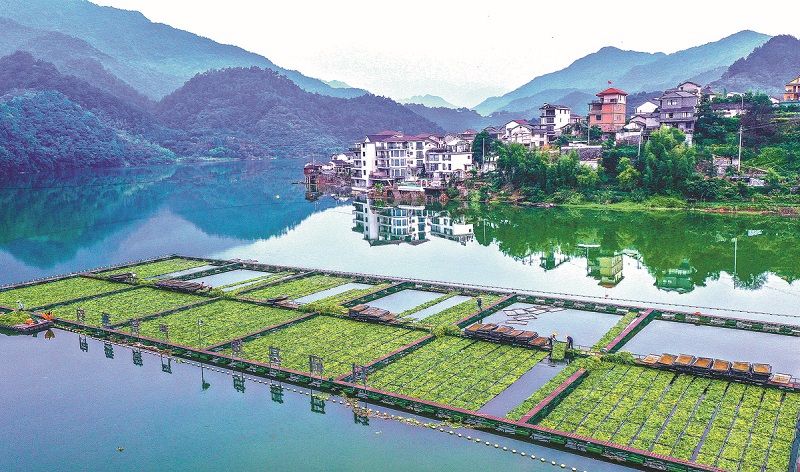Legislative progress helps safeguard environment

Farmers move trays of aquatic vegetables in Qiandao Lake used to enhance the purification capacity of the water body in Chun'an county, Hangzhou, Zhejiang province, on Tuesday, the first National Ecology Day. [Photo by Yang Bo/For China Daily]
Over the past decade, China has sought to expedite legislation aimed at protecting the ecological environment, the country's top legislature said.
Tuesday marked China's first National Ecology Day, which was established at a session of the Standing Committee of the 14th National People's Congress, the top legislature, in late June.
China has in place more than 30 laws, over 100 sets of administrative regulations and many local regulations focused on eco-environmental protection. These efforts contribute to building sound ecological conservation systems, according to the Legislative Affairs Commission of the NPC Standing Committee.
The legislation has increased penalties for violations of relevant laws and regulations, the top legislature said.
What makes Aug 15 special is that on that day in 2005, President Xi Jinping, then Party chief of Zhejiang province, first put forward the concept of "lucid waters and lush mountains" being invaluable assets while visiting Anji county in the province, according to Xu Anbiao, deputy head of the NPC Standing Committee's Legislative Affairs Commission.
The assertion was a core idea of Xi Jinping Thought on Ecological Civilization.
Ecological civilization is a concept promoted by President Xi for balanced and sustainable development that features harmonious coexistence between humans and nature.
Xu said that the establishment of National Ecology Day would enhance ecological understanding among the public and help the nation better participate in global environment and climate governance.
This in turn would promote the building of a community with a shared future for mankind, he added.
The top legislature has strengthened environmental protection and ecological conservation by formulating and amending laws.
Since the 18th National Congress of the Communist Party of China in 2012, the NPC Standing Committee has formulated and revised 19 laws concerning the environment and ecology, with one piece of legislation being reviewed, Xu said.
In April, the committee adopted a law on ecological conservation for the Qinghai-Tibet Plateau, known as "the roof of the world", to protect its fragile ecosystem. It is a new addition to China's laws for special regions, following the enactment of the Yangtze River Protection Law in 2020, and the Yellow River Protection Law and the Black Soil Protection Law last year.
To curb pollution in various areas, the committee adopted the Soil Pollution Prevention and Control Law in 2018, and passed the Noise Pollution Prevention and Control Law in 2021.
More importantly, ecological civilization was upheld as a basic principle when the NPC amended the Constitution in March 2018.
While constantly filling the gaps in legislation, it also amended laws on wildlife protection and the prevention of pollution in water sources and forests to meet new demands in those regards.
"We fully eliminated content inconsistent with the construction of an ecological civilization in existing laws, in order to ensure the uniformity of legal documents and make them more powerful in the fight against pollution," Xu said.
The country's laws and administrative regulations involving the environment and ecology "have laid a solid legislative foundation for the ecological civilization", he added.
During the formulation and amendment of the laws, many residents, especially those engaged in environmental protection, have shared their ideas and provided their suggestions.
"For instance, when we formulated the Yellow River Protection Law, we contacted villagers living in the upper, middle and lower reaches of the basin by collecting legislative opinions in Lintao county, Gansu province, via video link," said Sun Zhenping, head of the commission's office.
"During the online communication, we learned what environmental difficulties those villagers were eager to solve and knew what ecological measures should be taken urgently from their opinions," he said, adding that five pieces of advice were finally accepted and written into the final version of the law.
The increasingly improved legislative items have given a clear direction for judicial authorities in ecological resource utilization, environmental remediation and fighting polluters.
Data released last week by the Supreme People's Court, the country's top court, showed that Chinese courts heard 110,000 environmental and ecological cases from January to June, down 7.9 percent year-on-year.
- Top legislature schedules standing committee session for late February
- China's top legislator meets with Uruguayan president
- Senior legislator surveys Anhui on formulating outline of provincial 15th Five-Year Plan
- China's top legislator meets with British PM
- NPC deputies see more engagement with top court



